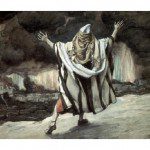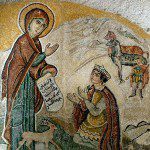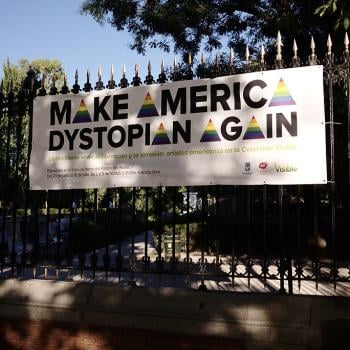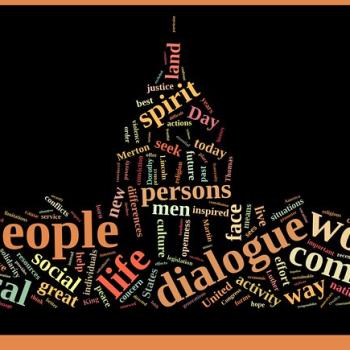Again I saw all the oppressions that are practiced under the sun. And behold, the tears of the oppressed, and they had no one to comfort them! On the side of their oppressors there was power, and there was no one to comfort them (Eccl. 4:1 RSV).
In modern times, it’s been long recognized that the elite hold the power which they use to keep themselves among the elite. What they do, whether or not they intend to do so, ends up oppressing ordinary people as they try to make their way in the world. The youth of every generation are among the first to witness this fact, as they find they have to push themselves into those same elite positions (squashing others along the way), or they find themselves to be those who are among the oppressed imprisoned by a world system which shapes their lives and allows a few “successes” for but a multitude of “failures.”
If even if someone is “successful,” and they are able to join the world of the “elites,” they find that the hard toil did not pay off as intended. They remain unsatisfied. “All the toil of man is for his mouth, yet his appetite is not satisfied” (Eccl. 6:7 RSV).
Everywhere we go, we find wickedness in control. The whole system is corrupted, and few, if any, are able to entirely overcome its taint in their lives. Even those working for the oppressed and against the powers that be often find themselves corrupted by its influence. “Moreover I saw under the sun that in the place of justice, even there was wickedness, and in the place of righteousness, even there was wickedness” (Eccl. 3:16 RSV).
It is therefore appropriate that we find many first time authors of novels explore this kind of exploitation in their works. Despite the difference in sentiment, and therefore style and tone, represented by protagonists of quite different virtues, in the first novels of Evelyn Waugh (1928) and John Wain (1953), there is, curiously, a common core which unites them together. In both, the main characters have to work their way through the accidental tragedies of life, demonstrating the injustice of the world system by showing how success and failure in the world often comes not from the accomplishments of the ordinary worker, but the arbitrary choices of the elite in charge.
![Evelyn Waugh By Carl Van Vechten (1880–1964) , via Wikimedia Commons [Public Domain]](https://wp-media.patheos.com/blogs/sites/637/2016/07/Evelynwaugh-225x300.jpeg)
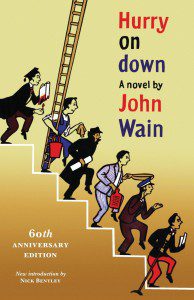
John Wain’s first novel, Hurry on Down, was brought out when the “Angry Young Men” were beginning to make a place for themselves in English Literature. The protagonist, being himself an angry young man, established Wain as a member of that circle, even though he did not want to be identified as such (just like he did not want to be called an Inkling despite being a regular and active member of their meetings). The anger represented the bitterness which the middle and lower classes had begun to feel in post-War England. They the changing face of society, where the opportunity for success was being taken away from them. Here, once again, we have the story of a youth trying to make his way into the world, and finding himself once again stuck in a comedy of errors, though not of the same kind as found in Waugh. Here, the protagonist Charles Lumley, actually had finished university, believing he would be able to find work and so marry is fiancé once he found his way in the world. He did not really consider what he would be doing after he finished his degree, but he thought the opportunity would be there so he did not worry. He quickly discovered that he was wrong. After a bit of rest, he goes into the world, trying to make his way – finding he has little to no money, no means to take care of his fiancé, and so he slowly finds himself doing all kinds of odd jobs, some better, and more ethical, some worse and criminal, all to make it through the day. The novel is episodic as we see Charles go from job to job, situation to situation, losing old friends and making new ones, discovering new ways the world oppresses the middle and lower classes, all the while Charles tries to remain sane and in control, no longer bound by the expectations put on the differing classes. He wanted out of the prison society placed upon him, but that freedom came at a high cost, and indeed, as he would find again and again, he never was entirely out of that prison no matter how much he rebelled against it. We see Charles trying various jobs, from window washer (finding himself ultimately pit against other workers in the field who saw him as an outsider trying to take over from them), to being a car mover and driver (and thief), to being a bouncer at an unsavory club, to working at a hospital, before finally getting a “nice job” at the end. But it is apparent that he stumbled into that job on luck, and he was not entirely pleased with his success because of how accidental it was:
“’Well, I suppose I ought to be overjoyed,” he said, “and yet I can’t quite feel it’s anything but a freak of chance, and one doesn’t like owing one’s way of life to a freak of chance.”[1]
Hurry on Down is filled with dark humor; there is a tone of a bitter cynicism found throughout the story, exposing in the process, the way the workers of the world are held captive by the order of things established by the elite. And here, it is not the naïve elite of Waugh; they are also given to partying, but their nature is darker, more understanding of the brutality which got them to where they are, and their partying itself is darker and more self-destructive as a result. This is not to say all who are connected with the elite are in the same position: some do come to help Charles, and show some sort of friendliness to him, but their help always comes with expectations which he is not always able to meet.
What ties the two novels together is not their style, but the understanding of how chance is involved with the success and failures of people who are members of the ordinary working class. Waugh has a different sensibility and appreciation of the elite; though he is capable of showing some of them doing great evil, there is a sense of sympathy with them, while Wain has no sympathy, but is rather bitter at how they have helped mess up the world and force people, by the accidents of life established through their social order, to enter the margins of society in order to survive. Both of them understand success is not guaranteed in the world. Waugh understood how the ordinary person is really nothing to many of the elite, so that it is not always an intentional cruelty but just pure disassociation which allows for so much evil, while Wain understood more how the common people suffer unjustly as the elite control the destinies of all around them and so often know full well what they are doing. Wain can no longer accept the naïve nature of the elite as an excuse; those who tend to find themselves successful in the world either find it by accident, or they take on and apply the powers of the elite in order to guarantee their new position in society. Both novels are also episodic in their presentation (and I have tried to be very generalized in my description of both because both novels are worth reading, and I do not want to present all the characters and situations in such a way to spoil the novels) – and this episodic character fits quite well with our times, where people, like the characters in these novels, find their lives constantly changing so quickly because of the random or devious choices of those in power. They present an everyman situation which has not gotten better since the novels were written, but much worse, as the elite have taken more of the world into their own control, leaving more people fighting against each other for the crumbs they have left behind
Oppression is everywhere; those who are holding positions of power are often seen, or believed, to be righteous – and yet, if we examine carefully the social structure and those who hold positions of power, wickedness is there. For some, it is a naïve wickedness, unintentional oppression of others, as best represented by Waugh, but we can’t leave it as such; Wain is right in being angry at those who try to claim such ignorance. They are people who hold high positions of society – and their selfishness has blinded them from the effects of their wickedness, but yet, that selfishness alone should be enough for them to realize they have chosen an immoral path. The fact that some can find the accident of success in the world does not mean the system which allows them such success is just, in fact, it means the opposite: if success is a mere accident, then justice has been rejected because success and failure is not based upon some reasonable standard. When we find out the way things work in the world, It is normal to be bitter, to fight back in such a position, to lament and desire a change.
Of course, for the Christian, seeing the world as a place where social injustice is normal and so what happens in these novels is not exactly a surprise. Yes, good people can at times find themselves among the elite, and if they are, there are all kinds of expectations placed upon them less they lose their goodness (they need to be good stewards of their resources, using it for the benefit of the oppressed). But, as with the elite being a small group as it is, those who are truly moral will be a smaller portion of the elite; most of the good will be found in ordinary society, often finding themselves in difficult situations like those found in these books. Some will be able to keep to their integrity, and others (like Charles) will lose themselves as they try to find a way to survive. We will find ourselves having some times of joy and times of pain and sorrow, as we find everything comes and goes in the world if flux. If our desire and hope is only for worldly gain, we will find ourselves either bitter and angry, or we will go insane, once we understand how society has shaped the world. Nothing is indeed new under the sun – wickedness will be everywhere. When we have to face its effects upon us is most likely not up to us. Both of these novels can be said to be exaggerated in the way they present this truth – this exaggeration is what allows both of them to be comical, but it is only in such comic relief can we find the grace we need to keep our sanity and peace in the world corrupted by power players who care less about the people who get trampled in the midst of their play.
Perhaps it is time someone took up this kind of novel once again, to be realistic in style and yet darkly comical in nature, to represent the new way this truth is being established in the world today. Waugh and Wain wrote of and from their times, which in a way, explains the considerable difference in the spirit and style between their respective work. We need a similar work today to help overturn the false belief that everyone can and will be successful if they just work hard. No, the system only gives the illusion of such success and as soon as this illusion can be exposed, the sooner the system itself can be dealt with and replaced by something hopefully better. This is why, though the theme is dark in these novels, they do not need to make us give up hope. Despair is giving in to the system. As long as we survive, as long as we endure, there is hope for the future. Both novels, in their own way, even end with this hope — the characters survived what they suffered from the accidents of fate. They were able to find a kind of peace which transcended the system once they knew they system for what it is. This is the hope which is needed to be written about in novels today. We need to encourage people to push on, not because they are necessarily going to be of the elite , indeed, we need to distance ourselves from such dreams, but because there is something good and lasting which can be found once the way of the world is seen through in accordance to the wisdom which is at least as old as the book of Ecclesiastes. “Remove vexation from your mind, and put away pain from your body; for youth and the dawn of life are vanity” (Eccl. 11: 10 RSV).
[1] John Wain, Hurry on Down (Harmondsworth, Middlesex England: Penguin Books, 1971),247.
Stay in touch! Like A Little Bit of Nothing on Facebook:
A Little Bit of Nothing


